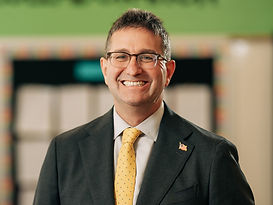GUEST COLUMN.
STAKEHOLDERS: GOVERNMENT'S UNPAID CONSULTANTS
By Marc Holzer, Distinguished Research Professor (Ret.) Institute of Public Service, Suffolk University, Boston and Director Emeritus, National Center for Public Performance

I recently published a volume titled Rethinking Public Administration (Edward Elgar, 2023). Considering the magnitude of topics that could easily be covered in a volume with that title, the question of stakeholders in the public sector was foremost in my mind.
There are so many questions here: Are we informing all stakeholders as to the performance of their governments? Can we advance the interests and values of competing stakeholders? Do we even recognize who the stakeholders are?
Public organizations reflexively acknowledge their “stakeholders” in strategic plans, performance measures and budget hearings. But few policy or management officials are cognizant of the very broad array of stakeholders for whom the goods and services produced by their agencies are vital links in adding value to the lives of their citizens and clients. The result: many constituencies have little or no input into the system for planning and implementing public policy.
Performance improvement, to be achieved on a long-term basis, requires a sensitivity to many constituencies, an awareness of opportunities to develop partnerships, and a realization that multiple stakeholders may have competing agendas. Potential stakeholders may include, but are not limited to: voters, customers, clients, communities, citizens, employees, board members and elected officials, businesses and their representatives, other units of government, funding agencies, partner organizations, unions or professional associations, foundations, charities, and the media.
How can the people in the public sector serve the needs and rights of such a broad array of people? I like to use the word from music: orchestration. An orchestral performance is degraded if instruments are not tuned, if musicians are not adept, if one group of instruments overwhelms others, if the sound communicated to the audience is flat, if the conductor is mediocre.
Talented musicians yearn to understand how to balance the deep bass sound of the tube with the higher pitch of the flute. Stakeholders’ needs, similarly should be taken into account in such a way that no one’s interests should be served over those of others; just as a too-loud tuba will overshadow a softly played flute.
All the groups served by state and local government deserve a voice, and if their input is overlooked or only proforma, then trust and financial support may suffer.
The problem-solving alternative is a customer-focused culture that accepts and acts upon stakeholder feedback. Including, notably, other government departments – which are frequently not recognized as having a vested interest in the outcomes delivered by one another. But every government service is a supply chain endeavor. The outputs and outcomes of a public water supply service have implications not only for residents, but for public health, hospitals, fire suppression, agriculture, parks, and many other functions. A reliable, safe water system reduces costs and enhances outcomes for core municipal, county and state services down the line.
Similarly, a high-performing school system may contribute to higher rates of economic growth and lower levels of criminal behavior. Government partnerships with nonprofits can enhance preventative healthcare, helping to avoid costly interventions as people age. Likewise, any agency or department is a customer for centralized functions such as purchasing, contracting, training, recruitment, and maintenance.
Rethinking the definitions and roles of internal actors, internal and external, leads me to a related question: Are those who make and implement public policy equipped to optimize input from, and service to, stakeholders? The answer, for the most part is a resounding “No!” Elected officials at all levels typically rely on “common sense” or input from subsets of constituents rather than informed research.
This issue is amplified by the sad fact that many of those who are employed within government or nonprofits typically don’t have the skills necessary to holistically manage organizations as complex as cities, counties, or states. Only a small minority of those individuals have MPA or MPP degrees, and even the degree holders have a remarkably incomplete set of the competencies necessary to carry out their responsibilities. Lawyers, doctors, scientists, educators at all levels are unlikely to have public policy or management degrees. Where privatization or contracting out has taken root, management values are unlikely to acknowledge a broad range of stakeholders, and the old adage holds true, that “the public and private sectors are alike in all unimportant respects.”
Within my volume on Rethinking, that deficiency of competencies led me to propose that anyone directing a public organization, elected, or appointed, be required to familiarize themselves with a range of those skills, distilled from literature and practice.
Competency models exist at the Federal level. At the state and local levels, the Certified Public Manager Program (CPM) has long offered a comprehensive set of offerings, culminating in a certificate. Still, that initiative reaches only a small percentage of the potential audience.
Given that many career pathways can lead to organizational leadership roles, my “solution,” if that is not too ambitious a term, is to require that everyone practicing public management, de facto, be required to enroll in CPM-type training; self-paced, online, competency-based coursework; or degree programs in which competencies are embedded, such as those that address internal and external cooperation and coalition building necessary to achieve common goals, including adeptness in stakeholder analysis, customer service, coalition building, cooperation and partnerships, mobilizing support, creating energizing environments, and performance management.
Public organizations deliver daily on the many promises made in our founding documents, legislation and statements from our policy leaders. They could do an even better job if they rethought their competencies and engaged professionally with all of their stakeholders—their unpaid consultants.
The contents of this guest column reflect those of the author and not necessarily those of Barrett and Greene, Inc.



































































































